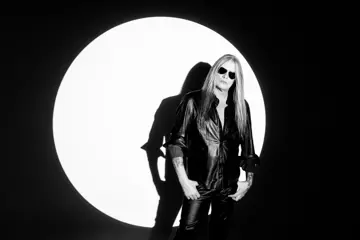never went to film-school. The 31-year-old filmmaker – already three features into an impressive career – doesn't think it's remarkable in and of itself, but being an artistic 'outsider' is something she identifies with. Hansen-Løve came to filmmaking via the influence of her love-interest, the film-critic-turned-auteur Olivier Assayas; making her debut with 2007's All Is Forgiven after no time in an academy. This would be a meaningless biographical footnote if not for the fact that Hansen-Løve's pictures move with an unconventional screenwriting rhythm that no one would ever teach, but is only her own.
“I try not to think at all about how a story 'should' be told. I've always had a strong belief in the importance of thinking on your own,” says Hansen-Løve. “When I write, I try to find a way in the structure of all my films that reflects my own way of seeing things and my own experiences, not the established rules of scriptwriting... I have troubles with the way some young filmmakers write scripts; they just feel so conventional to me. Sometimes even in films I like very much. There's something in the way that they write where I can tell they're trying to apply the rules that they've been told about the efficiencies of scriptwriting.”
Her latest oddly-moving picture, Goodbye First Love, chronicles a young love affair over a period of years; intense teenage infatuation unfolding into a portrait of two kids turning into adults. It's about “love and the impossibility of turning a page”, “the passing of time”, “[love] that starts so very young and doesn't ever really go away”, and “how you become who you are”.
The filmmaker talks about taking inspiration from '60s acid-folkies the Incredible String Band, specifically their jam First Girl I Loved. It's telling, because music plays a key part in Hansen-Løve's particular aesthetic. “I don't work with composers, so I feel very free with my choices of music,” she offers. “I enjoy trying to find music that is both pertinent and to-the-point of the film, but also unexpected, and will give it a new colour. I enjoy creating my own language with the use of music. I love to not use music for a long stretch of the film – 20 minutes, 25 minutes – and then put in one song, one really important song that you will really listen to because it comes after this silence.”
trying to find music that is both pertinent and to-the-point of the film, but also unexpected, and will give it a new colour. I enjoy creating my own language with the use of music. I love to not use music for a long stretch of the film – 20 minutes, 25 minutes – and then put in one song, one really important song that you will really listen to because it comes after this silence.”
Don't miss a beat with our FREE daily newsletter
Her idiosyncratic use of pop-song was never more unexpected that at the end of her masterful Father Of My Children – a radically-bissected drama inspired by the life of the late producer Humbert Balsan – when Hansen-Løve flogged the musical dead-horse of Doris Day's Que Sera Sera without irony. “I feel very sincere about music; I try not to care about what other people think, I try to just be honest to my own sensibility,” she offers. “My mother used to sing that to me is a child, because of Hitchock's [The Man Who Knew Too Much]. So I've always loved that song; Que Sera Sera has always moved me. I knew that some people would be shocked by the use of the song, like it was a bad selection, but it was so perfect for that ending: it's a mother singing to her children about life going on.”















